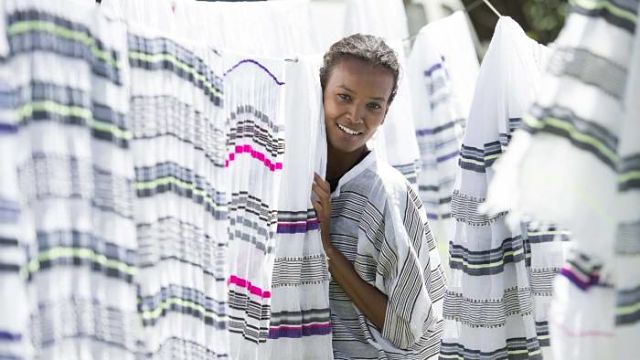 The supermodel implemented a sustainable approach while sponsoring her foundation for African women. (Photo: Founder Liya Kebede at Lemlem's Muya workshop in Addis Ababa/FT)
The supermodel implemented a sustainable approach while sponsoring her foundation for African women. (Photo: Founder Liya Kebede at Lemlem's Muya workshop in Addis Ababa/FT)
THE FINANCIAL TIMES
Liya Kebede’s brand Lemlem offers Ethiopian craftsmanship that sells
When supermodel Liya Kebede was growing up in Addis Ababa, she wore comfortable Ethiopian clothing — ample dresses made from strips of woven cotton sewn together. But traditional clothes were beginning to disappear, replaced by the spread of western fast fashion and access to cheap second-hand garments.
Since 2007, her fashion label Lemlem has revived commercial interest in Ethiopian weaving, putting back on the map the artisanship that was at risk of falling into oblivion.
“I wanted to reinject an energy and fuel back into the artisans and into the artisanal industry,” Ms Kebede explains. “The idea is to inspire others to look at Africa as a source of high-end artisanal work, and not just be a place to which you outsource for cheap labour.”
Tailors all over the continent make clothes using traditional techniques, with patterns and styles that are often unique to their culture. But the arrival of faster production methods threatens this treasure trove of skills and traits, in Ethiopia and elsewhere.
“Few in the fashion industry thought it possible to ever use Africa’s traditional skills on a commercial scale,” she says. “We are showing local creators and local entrepreneurs [how] to invest in their own local skills and skill makers, and not just look to the outside.”
Although Lemlem, which means “blooming” in Amharic, shipped 35,000 items last year, 85 per cent of which were made in Ethiopia, Ms Kebede admits it is still “uncharted territory”.
Experienced suppliers do not exist in Ethiopia — each partnership must be built from scratch, workers need to be trained and exports are arduous.
Liya Kebede with Ethiopian artisans working on cotton garments © Gilles Bensimon
This results in long production times and expensive individual products — most of Lemlem’s dresses sell for between $250 and $450.
As the fashion world wrestles with questions of sustainability and wastage, Ms Kebede believes there are opportunities for African brands such as Lemlem, in creating a small number of “beautiful, unique” garments, for consumers who want fewer, better-made clothes.
“The whole world is thinking about excess in general, and in the fashion world there is so much of it,” she says.
Lemlem is now working with 300 artisans, up from 50 when it started, but it will not push for very high production volumes.
—
Related:
Liya Kebede Looks Regal on Porter’s Summer Escape 2019 Covers
Join the conversation on Twitter and Facebook.

























